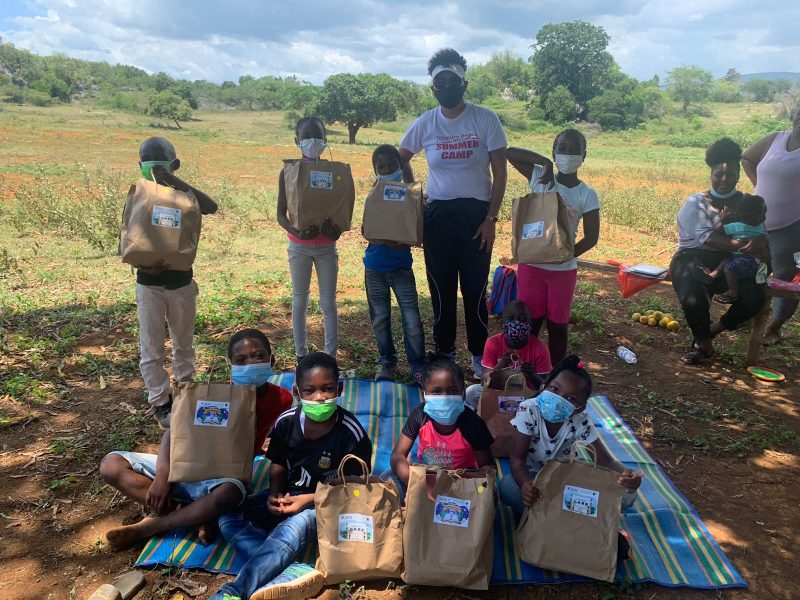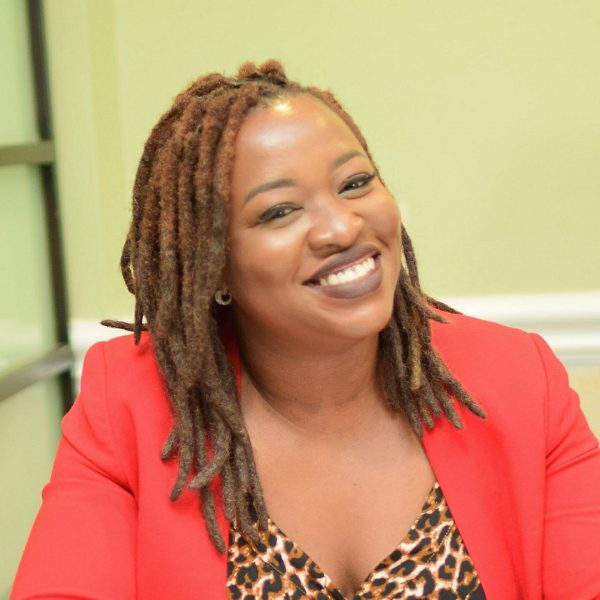‘We have to always focus on what inclusion looks like’

Siseenia Moxam Nelson, founder of the Treasure Beach Youth Group and Summer Camp in a rural south coast community, helped distribute the literacy care packages to students of Hopewell Primary School. Photo courtesy Latoya West-Blackwood, used with permission.
With most Jamaican primary and secondary schools closed since March 2020 when the country recorded its first case of COVID-19, the pandemic has dealt education a severe blow. Children, especially those from poorer households, have faced connectivity issues because of a lack of Wifi, devices or both, and learning is made all the more difficult if their home circumstances are unsuitable.
In her recent parliamentary report, Minister of Education Fayval Williams acknowledged that despite tremendous efforts not to “lose” students through a range of initiatives, more than 120,000 children have disengaged from the educational process since the pandemic began.

Publisher and outgoing chair of the Book Industry Association of Jamaica (BIAJ), Latoya West-Blackwood. Photo courtesy West-Blackwood, used with permission.
While face-to-face classes resumed on May 10 in more than 350 schools, this was limited to students sitting exit and external exams. It is hoped that schools will fully reopen in September, but there is so guarantee. The impact this situation is having on literacy prompted outgoing chair of the Book Industry Association of Jamaica (BIAJ), publisher Latoya West-Blackwood, to start an initiative encouraging children to read—for pleasure.
In early May, the BIAJ partnered with the United States-based GrassROOTS Community Foundation to donate 500 “literacy care packages” to 12 Jamaican primary schools. In an email interview, West-Blackwood explained more about the project and her own vision for reading.
Emma Lewis (EL): Why do you think promoting a love of reading in children is especially important at this time?
Latoya West-Blackwood (LWB): A national culture of reading and knowledge has always been important. The pandemic has just put a magnifying glass to some things we've always needed to address as a society. Since 2011, the BIAJ, through the Kingston Book Festival, has been campaigning to encourage reading for pleasure. The cultural experience might have introduced children to books and reading as something for ‘bright people,’ or a means to an end when trying to get good grades or pass an exam.
We've hosted events […] to demonstrate that stories have real power. Stories deepen their understanding of the world from all angles: the environment, cultures, conflict management and self-care, or just a good laugh. Our current concern is for children who pre-pandemic had limited access to literature, and have now been cut off for over a year from libraries or caring adults who nurtured a love of reading.
For those fortunate enough to have safe homes and access to books, reading has been a source of comfort, joy and an escape from the heaviness of the challenges we now face. We are grateful for partnerships like the one we've formed with the GrassROOTS Community Foundation […] that have allowed us to reach children across Jamaica.

Boys at the Trench Town Reading Centre read a book about Nelson Mandela in 2013. Some of the literacy care package donations were made to children of the Trench Town community. Photo by Emma Lewis, used with permission.
EL: Do you think that enough reading material is being produced for girls and boys of colour in the Caribbean? If not, what's missing?
LWB: Can there ever be enough books? Not for me! My dream would be to have many more titles being produced annually, incorporating the latest digital technology to provide an exciting and immersive experience across genres, especially in areas like history, math, science and culture. Representation matters and there are many stories to be told—those that teach, those that inspire, and those that make us laugh with no great moral lessons tied in.
Publishing is a business and there's much room to grow an indigenous industry in Jamaica and the Caribbean […] that merges passion with profit. There are some well-produced books coming from publishers like Blue Banyan Books and the CODE Burt Award for Young Adult Literature. We need more programmes […] to drive the unearthing of new talent with the required funding and marketing efforts to support.

A volunteer packs books for the literacy care packages. Photo courtesy Latoya West-Blackwood, used with permission.
EL: But are Jamaicans readers?
LWB: I get asked this question a lot and sometimes it seems as if we've bought into a stereotype [that Jamaicans don't read]. We don't have a robust national reading culture, but have we examined why? Reading is a habit. Reading is magic, yes, but it's definitely not rocket science figuring out why there's a challenge with reading in our country.
How are children introduced to books? Do they have access regardless of class or abilities? How many of Jamaica's primary schools have a dedicated space where children are encouraged to read widely and have discussions? How many communities have well-resourced libraries with trained librarians and a regular roster of programmes and activities to engage citizens? How do we expect critical thinking to be nurtured? Through exams? The answers to these questions will become even more relevant now, when there is mass disruption to education, increased inequality, and an emphasis on higher-order thinking and skills in a technologically driven world.
EL: How has online learning impacted reading for children? Do devices enhance or detract from the joy?
LWB: Online learning has definitely provided a safe platform for continued learning as we all try to figure out reopening schools safely. There's also the development of new digital skills for teachers, students, parents and other stakeholders. I see a hybrid system being the way of the future.
For children who were reading before and continue to have access to books, the pages have been a safe place from the pandemic. For others, the situation has worsened; those are the students we are worried about. It will take a collective, sustained effort to reengage these minds, because there's no doubt about the place of readers in the age of a knowledge-driven global economy. We cannot leave any of our children behind.
Finally, there's no competition between printed books/content and technology. It's a regressive mindset to pit one against the other, even for business purposes. Technology continues to shape and transform how we experience the world. It is the same for publishing. We have to always focus on what inclusion looks like.

At the Trench Town Reading Centre in 2013, this trio reads from a book by local publisher Blue Banyan Books. Several literacy care packages were sent to the Trench Town community. Photo by Emma Lewis, used with permission.
EL: What is your vision for literacy in Jamaica? How can it be given a major boost in the next 10 years?
LWB: A key part of my vision for literacy in Jamaica is connected to increased strategic funding and improving children’s learning outcomes by providing early grade learners (this is where the change has to start) with quality and data-driven literacy programmes, in school and out of school. I was fortunate to work with Dr. Jean Beaumont and her EduConnect team on the Latin America and Caribbean Reads project, which has provided Jamaica and other countries across the region with a blueprint to model effective reading programmes and assessments (the Ministry of Education plays the leading role here). [We also need] to review and revamp teacher training (teachers who do not read cannot motivate students to do well at reading), and community action (mobilising parents and other stakeholders to support children outside of the classroom and make reading fun with culturally relevant materials). It is also my dream to see Kingston as a UNESCO World Book Capital.
Post a Comment